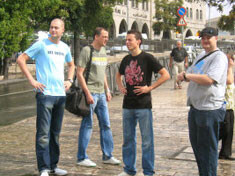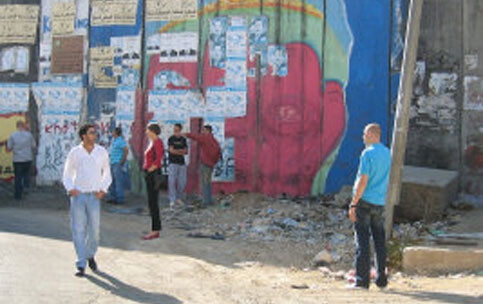The Electronic Intifada 4 November 2006


Photo: Mieke Zagt/ICCO
Traditional ways of spreading information about the occupied Palestinian territories and Israel did not bring about fundamental changes in public opinion for decades. An opinion poll held in September 2006 showed that only 30 percent of the youth said to receive information about the Israeli Palestinian conflict regularly. In order to explore new ways of conveying information, Dutch development organization ICCO invited the Dutch rappers Lange Frans and Bass B. to visit the occupied Palestinian territories and Israel.
During the visit the rappers did not need their bodyguards to protect them from pushy behaviour of crowds of Dutch fans. They met their colleagues of Da Arabian Music MC’s ( D.A.M.) from Lod, the Refugee Rappers from Dheisheh refugee camp near Bethlehem and the G-Town rappers from Kalandia refugee camp. Lange Frans and Baas B. scored several number one hits with rap songs on key social issues in the Netherlands. In social research among Dutch migrant and refugee youth the majority indicated that they felt Lange Frans and Baas B. could help to bring change into their difficult situation in the Netherlands. ICCO hopes that the visit will inpsire the rappers to write new songs.
From TMF Music Awards to Tel Aviv
We meet the rappers in the early hours of the morning at Schiphol airport in Amsterdam. They arrive almost straight from the Dutch TMF Music Awards concert where they performed the closing act. They used the opportunity to inform the Dutch press about their visit which resulted in journalists chasing the rappers in order to get a scoop. In their suitcases they brought their camera’s and their lap top with the beats of their raps. The keyboard did not fit in a bag so it is carried as hand luggage. While we are waiting for our permit to enter the country, it is clear that the rappers stand out in the crowded entrance hall in Tel Aviv as a group of young musicians.
Your being here is a token of hope
The D-men are close friends from Diemen, a town which lies under the smoke of Amsterdam. In a meeting in Jerusalem with two men of the Parents Circle, Palestinian Ali who lost a brother, explains that he is longing for peace. But he is very clear, that peace has a different meaning for Palestinians and Israelis. For Israelis peace means security, and for Palestinians it means starting to live. And it is Israel that can take the decision to remove the occupation, not the Palestinians.
The Israeli Rami lost his daughter and is a son of a survivor of the Holocaust. During the Holocaust people stood aside while Jews were murdered at an unimaginable scale. But right now Europe is standing aside while the Palestinian people are treated without respect for human rights and international law. Your being here and not standing aside is token of hope, he tells the rappers
Dheishe refugee camp
In Al Feneiq Center we meet our guide who will show us Dheishe refugee camp near Bethlehem. He tells us that the cultural centrer is built by volunteers and is meeting place for all the refugees. The building of Al Feneiq Center started in 1998 and was three times destroyed by the Israeli army, the last time in 2002. On top of the roof of the center we have a view on the refugee camp, Bethlehem and the wall. When we enter Dheihesh refugee camp we meet the children playing in the narrow streets that are no safe place to play. In a small room in a house we meet three young men of the Refugee Rappers. They rap on the music that they have recorded on their computer. They sing about life in Dheishe.

Photo: Mieke Zagt/ICCO
‘The Palestinian flag is my flag, green is the colour of land, red of my blood, white of peace and black is the colour of my anger.’ And, ‘All the walls left me in a desert called my history.’
The D-men tell the Refugee rappers that they started the same way ten years ago. Keep on rapping and improve yourselves, you will get there.
Settlements around Jerusalem
The Alternative Information Center has organised a tour around Jerusalem to show how the settlements are enclosing Jerusalem. Our guide Yasser shows us the settlements on the hill tops and how the plans are laid out in the countryside to occupy all the land. In a shopping mall in Maale Adumin Frans asks a young man in a shop that sells sports wear what it is like to live in a settlement. The young man responds blank, living in a settlement on Palestinian land is not an issue. In Abu Dis we stop at the wall that separates Abu Dis from Jerusalem. Lange Frans, which means tall Frans, is very tall. He looks tiny when stands in front of the wall1.
Radio broadcast
Every morning the rappers reported in a popular prime time radio programme, directly about the people they met and the stories they had heard. Lange Frans informed the public that there will be held elections for a new Dutch parliament in November. He called the voters to ask politicians what they are going to do to bring an end to the occupation.
Hebron
During a visit to Hebron the impact of the occupation on the lives of Palestinians became very clear. On our way to Hebron new road blocks were erected, our mini bus had to stop several times for flying checkpoints, we saw military posts all over town, four year old Palestinian children who had to open their small bags for a soldier at a checkpoint in Hebron, young Palestinian men and boys who were not allowed to enter the Palestinian side of Hebron, and a group of Israeli soldiers perform how they round up a group in a street in sector H2, where 650 Jewish settlers live. Our guide in H2 is Yehuda, a member of Breaking the Silence, a group of soldiers who inform the public about the behaviour of the Israeli military against Palestinian civilians. Yehuda shows us the demolished Palestinian houses who stand as silent witnesses. For most soldiers ‘a good Palestinian is a dead Palestinian’ tells Yehuda. A settler became very angry with Yehuda, and shouts, ‘You are a traitor, because of you Jews are dying’.
Ramallah
In Ramallah we meet medical doctors who are long time friends of ICCO. They repeat what we heard from Rami of the Parents Circle, ‘We are glad you are here, we don’t meet many foreign groups here. The occupation dehumanises our people. We must make friends internationally, to give us a human face.’ Frans asks the doctors how they succeed in living their lives in such a positive way. One of them answers with, “We didn’t choose for an occupation, but we have to deal with it. We have to work, to love, to stay in our country, to stick to our land. This serves our future. We will not disappear and therefore remain a problem for the international community. Europe has a role to play.
Back in Amsterdam
On our flight back to Amsterdam our thoughts are full of faces, images, words, sounds related to a beautiful country that is scarred by the occupation. An occupation that has a tremendous impact on the lives of Palestinians, but also leaves it marks on the Israelis. On 10 December Lange Frans and Baas B. will perform in the Rap4Justice festival2, where they once again will meet the rappers from D.A.M. The documentary Slingshot Hip Hop, about the lives of rappers in Gaza will be shown. In a few days time they have to perform at an event called ‘The night of the UN’. Where they will talk about their trip to Palestine and Israel. And hopefully they can translate their impressions of this visit in another number one hit. As Lange Frans said, ‘In Palestine they have a lot of real issues to rap about’.
Related Links





